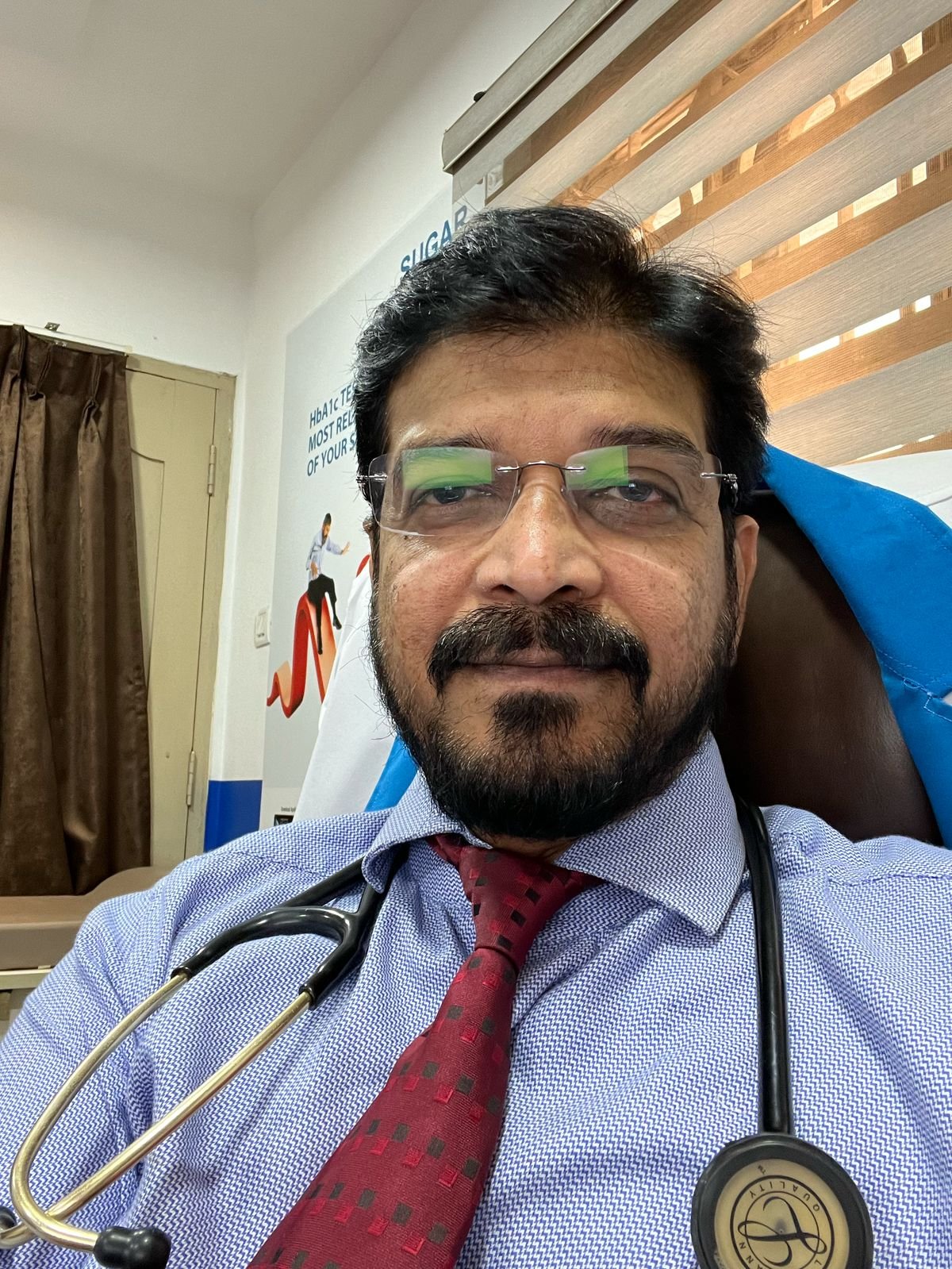
Dr. Vijay Viswanathan
MD, Ph.D., FRCP
Head and Chief Physician MV Diabetes North and South Chennai and Bengaluru.
Completed 34 years of practice.

MD, Ph.D., FRCP
Head and Chief Physician MV Diabetes North and South Chennai and Bengaluru.
Completed 34 years of practice.
Expertise
President RSSDI [Research Society for Study of Diabetes in India] 2025.
Honorary President D Foot International based in Belgium overseeing 193 countries.
Hon Gen Secretary Association of Physicians [API] Chennai.
Research
Research Interests: Diabetic Foot: Limb Salvage
Diabetes and Kidney [Did his PhD in this field in 1999]
Diabetes and TB [PI in RePORT India]
Over 300 Research Publications in peer reviewed journals


Senior Consultant Surgeon
Dr. G. Senthil is a Senior Consultant Surgeon specializing in Diabetic Foot Surgery, Plastic & Reconstructive Surgery, and General Surgery at MV Hospital for Diabetes. With over 25 years of experience, Dr. Senthil is a pioneer in conservative and limb-saving surgical approaches for complex diabetic foot complications. He holds an MBBS, MS in General Surgery, and MCh in Plastic Surgery. Known for his patient-centric and empathetic care, Dr. Senthil combines surgical expertise with global best practices to offer personalized, minimally invasive treatments for limb preservation.
25+ years of clinical and surgical experience
Specialized Expertise:
Diabetic foot surgery
Plastic and reconstructive surgery
Preventive and deformity-corrective foot surgeries
Conservative limb-saving surgical techniques
Multidisciplinary team approach to complex diabetic foot cases
Distinguished Approach:
Focus on limb salvage and amputation prevention
Minimally invasive surgical methods
Evidence-based, cost-effective, and personalized treatment
Regularly updates and integrates international best practices
Known for providing “last-hope” interventions in advanced diabetic foot complications
Academic & Professional Contributions:
Actively shares clinical knowledge and surgical insights with the global medical community
Advocates for early intervention and preventive strategies in diabetic foot management
Engaged in hands-on training and mentoring of diabetic foot care professionals
Participates in interdisciplinary forums and case discussions on limb salvage
Community & Patient Engagement:
Promotes patient education on diabetic foot care and prevention
Committed to holistic healing and long-term mobility for patients with severe complications

Diabetologist
Dr. Abishek S.R is a Consultant Diabetologist at MV Hospital for Diabetes, Royapuram — an IDF Centre of Excellence in Diabetes Care. He completed his MD (MBBS) from Tbilisi State Medical University, Georgia (EU), followed by a Fellowship in Clinical Diabetology at MV Hospital for Diabetes. With 3 years of experience, Dr. Abishek brings a focused interest in the prevention of diabetes, the management of newer types of diabetes, and Type 1 diabetes care. He actively participates in research, public awareness, and professional education initiatives.
3+ years of experience in Diabetology
Special interests in:
Newer forms of diabetes
Diabetes prevention strategies
Type 1 diabetes care
Community-based screening and education
Certifications:
Fellowship in Clinical Diabetology – MV Hospital for Diabetes
Certificate course in Hypertension, Obesity, and Diabetes – Joslin Diabetes Center
Professional Memberships:
Life Member, Indian Medical Association (IMA)
Life Member, Research Society for the Study of Diabetes in India (RSSDI)
Research & Publications:
Poster presented at RSSDI National Conference (Delhi):
Pulmonary function test and its association in Type 2 diabetes
Poster presented at RSSDI Tamil Nadu Chapter:
Prevalence of anemia in Type 2 diabetes in the absence of kidney disease
Published a case report in TAPIJ:
Diabetic Amyotrophy – A rare complication of diabetic neuropathy
Conferences & Faculty Roles:
Participant in RSSDI National Conferences (since 2020)
Participant in Prof. M. Viswanathan Diabetes & Diabetic Foot Updates (since 2020)
Faculty at the School of Podiatry – Chennai
Attendee at IWGDF Conference – Chennai
Community Involvement:
Regularly conducts and participates in diabetes screening and awareness camps across Chennai and rural areas

Diabetologist
Dr. Leela Baid is a Consultant Diabetologist at MV Hospital for Diabetes (an IDF Centre of Excellence in Diabetes Care), Chennai. With over 9 years of dedicated experience in managing diabetes, she combines clinical expertise with advanced diabetes technologies. Dr. Baid earned her MBBS from Silchar Medical College and pursued a Fellowship in Diabetology from Apollo Medvarsity. She also holds an MBA in Hospital Management and is certified in insulin pump therapy and advanced diabetes technology. She has been part of the MV Hospital team since 2014, with a special focus on both Type 1 and Type 2 diabetes management.
9+ years of experience in Diabetology
Special interests:
Type 1 and Type 2 diabetes
Advanced diabetes technologies (including insulin pumps)
Time in Range and modern glucose monitoring
Pediatric diabetes via the SWEET Project
Professional Memberships:
Life Member, Indian Medical Association (IMA)
Life Member, Research Society for the Study of Diabetes in India (RSSDI)
Research Contributions:
Co-investigator in key national clinical trials including:
Glenmark’s investigational therapy for painful diabetic peripheral neuropathy
Prandial Technosphere Insulin Inhalation Powder Phase III trial
Awards:
Dr. R.B. Singh, Dr. S.S. Rastogi & Dr. S.P. Varma Award – Indian Society of Hypertension (2018), for research on central blood pressure in diabetes
Research & Publications:
Co-author of peer-reviewed study:
“Prevalence of genitourinary symptoms in people with type 2 diabetes initiated with SGLT2 inhibitors” – International Journal of Diabetes in Developing Countries, 2024
Conference Presentations & Lectures:
Poster presentation at RSSDI 2022 (50th Annual Meeting):
“Prevalence of Genito-urinary symptoms among people taking SGLT2 inhibitors”
Invited speaker on:
Insulin pump therapy
Newer diabetes management concepts and “Time in Range”
Community Initiatives:
Active in diabetes awareness and screening camps across Chennai

Diabetologist
Dr. Uma Mahesh is a Senior Consultant Diabetologist and the Chief Consultant at Dr. Mahesh Diabetes Centre in association with Diabetacare (UK). With over 25 years of experience in diabetology, he is recognized for his leadership in diabetes research, patient care, and clinical education. Dr. Mahesh holds an MBBS from S.V. Medical College and a postdoctoral MDRC in Diabetology from the Diabetes Research Centre, Chennai. He served for over a decade at MV Hospital for Diabetes, a WHO Collaborating Centre, and currently leads community-oriented diabetes programs while contributing significantly to national and international clinical trials.
25+ years of experience in Diabetology
Special Interests:
Type 2 diabetes management
Advanced diabetes therapeutics
Clinical research leadership
Diabetes education and training
Clinical Roles:
Senior Consultant Diabetologist at MV Hospital for Diabetes (1999–2014)
Consultant at Madras Medical Mission (2001–2005)
Chief Consultant at Dr. Mahesh Diabetes Centre (2015–Present)
Academic & Teaching Contributions:
Faculty & Examiner for Fellowship in Diabetes (FCD), MV Hospital & IMA Tamil Nadu
Trained over 300 doctors in Diabetology
Editorial Board Member – IGNOU Diabetes Health Program
Faculty for WDF Project – Trained 3000 doctors nationwide
Contributed chapters to diabetes manuals for professional training
Professional Involvement:
Member, Expert Committee for Diabetes Community Health – IGNOU
Research Committee Member – Prof. M. Viswanathan Diabetes Research Centre
Awards & Presentations:
MVDRC Gold Medal Oration Speaker – 2014
ADA Poster Presentation – Neuropathy (2013)
ADA Paper Presenter – NHLBI-funded CAARS Translation Trial (2015)
Chaired key sessions on oral antidiabetic agents (OHAs)
Principal/Co-Investigator in Major Trials:
Sitagliptin & Pioglitazone co-administration study
Exenatide vs. Metformin and other monotherapies
SYR-322 long-term safety trial
GRC 8200 DPP-IV Inhibitor study
BI 10773 vs. Glimepiride (long-term efficacy trials)
Saxagliptin + Metformin study in pediatric diabetes
GCP Certifications:
Trained by SIRO (Mumbai), Eli Lilly (Bangalore), Novo Nordisk (Chennai, Bangalore), and BMS (Singapore)
Publications & Conferences:
Presenter at ADA and MV Hospital events
Active contributor to diabetes research with a strong national and global footprint
Community Involvement:
Leads diabetes awareness, education, and outreach through Dr. Mahesh Diabetes Centre
Integrates clinical care with education and early detection efforts for underserved populations

Diabetologist
Dr. Prashanth Arun is a Consultant Physician and Diabetologist at MV Hospital for Diabetes with over 12 years of clinical experience. He holds an MD in General Medicine and a PG Diploma in Diabetology from the Royal College (UK). His medical training spans reputed institutions including SRM Medical College and PSG Institute of Medical Sciences. Passionate about holistic diabetes care, Dr. Prashanth has been with MV Hospital since 2017, providing both outpatient and inpatient management, including ICU care.
12+ years of experience in Internal Medicine and Diabetology
Special focus on managing complex diabetes cases and complications
Awarded:
RSSDI Achievement Award (2023)
Top 100 Influential Indians (2022) – Hype Edge Media
SRM Eminent Alumni Award (2023)
Iconic Medical Influencer (2022) – ED Innova
Lifetime Member – RSSDI, API (India & Tamil Nadu), and IMA
Contributed chapters to national handbooks on:
Insulin Therapy for Diabetic Foot Ulcer
Emerging Diabetes Drugs and Kidney Disease
Regular faculty and speaker at national diabetes conferences
Certified in Basic and Advanced Cardiac Life Support (BLS & ACLS)
Published in top journals including:
JAPI
JIMA
RSSDI
TN MGR University Journal
Research interests include:
GLP1/SGLT2 therapies
Hyperuricemia in diabetes
Liver enzyme modulation
Principal/Co-investigator in clinical trials on:
Inhalable insulin
Recombinant insulin
Once-weekly formulations
Authored health articles in:
Times of India
Deccan Chronicle
ED Times
Health Shots
Strong digital presence:
Meta-verified influencer with 70K+ Instagram followers
15K+ YouTube subscribers
25K Facebook followers
Daily content focused on preventive health and diabetes education
Guest of Honour at major health awareness events and medical expos
 Amount to Pay₹0.00
Amount to Pay₹0.00
This method does not allow payments greater than 500 per day.
You must scan the QR code, click continue to attach the screenshot (it is the only proof of payment) and you will be able to complete the purchase.

WhatsApp us